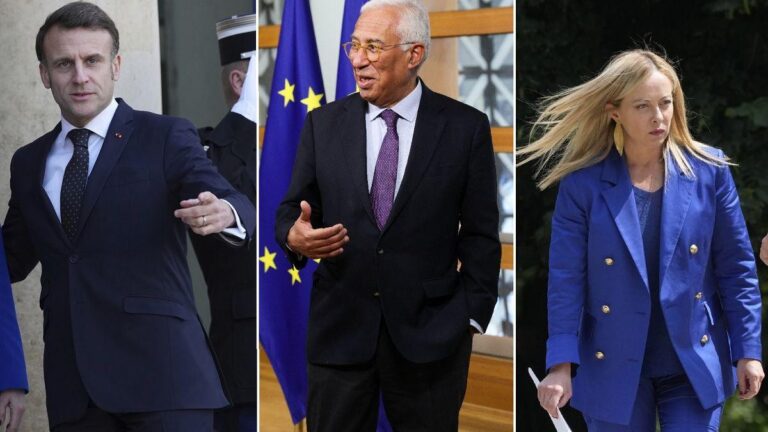In a world increasingly defined by geopolitical tensions, French President Emmanuel Macron has issued a stark warning to former U.S. President Donald Trump regarding the handling of Russian President Vladimir Putin. In a recent address, Macron emphasized the necessity for strength and resolve in international relations, especially amid ongoing conflicts and the shifting dynamics of global power. As France heralds what Macron describes as a “new era” in its foreign policy, this call for unwavering firmness with Moscow underscores the complexities of diplomatic engagement with authoritarian regimes. As both leaders navigate their respective approaches to foreign policy,the implications of Macron’s message resonate beyond Europe,signaling a critical moment in the interplay between Western democracies and their adversaries.
Macrons call for Statecraft Amid Growing Tensions with Russia

in the wake of escalating tensions with Russia, President Emmanuel macron has called for a robust approach to statecraft that emphasizes strength and decisiveness. With the geopolitical landscape constantly shifting, Macron has urged Western leaders to present a united front and resist any appearance of weakness that could be exploited by the Kremlin. He carefully articulated the need for comprehensive strategies that not only address immediate threats but also foster long-term stability in the region. This requires a systematic strengthening of diplomatic ties among NATO allies and a clear, firm stance against any attempts of aggression.
Macron’s remarks come at a critical juncture as he forges a new era of French foreign policy. In a recent briefing, he outlined several key principles that he believes should guide future engagements with Russia, including:
- Enhanced Defense Cooperation: Promote joint military exercises and intelligence-sharing initiatives among NATO members.
- Targeted Sanctions: Implement and enforce economic sanctions aimed at those involved in destabilizing activities.
- Open Dialogues: Maintain channels of dialogue to prevent misunderstandings and escalations.
- Support for Eastern European Allies: Strengthen the defense capabilities of countries at risk from Russian intervention.
To better understand the potential impact of these strategies, a comparison of current NATO member defense budgets versus russia’s military spending highlights the necessity of maintaining a formidable posture:
| NATO Member | Defense Budget (2023) |
|---|---|
| United States | $877 billion |
| France | $58 billion |
| germany | $57 billion |
| russia | $86 billion |
This data underscores the increasing necessity for France to not only bolster its own military capabilities but also galvanize support from its allies, reinforcing Macron’s position that effective statecraft is essential amid uncertainties in international relations.
Evaluating the Fractured Transatlantic Alliance and Its Implications

The recent remarks by French President Emmanuel Macron, cautioning against perceived weaknesses in dealing with Russian President Vladimir Putin, reflect a deeper unease within the transatlantic alliance. France’s assertion of a “new era” signifies a shift in its foreign policy approach, emphasizing a unified stance among western nations in the face of increasing geopolitical tensions. Macron’s warning to former President Donald Trump underscores the fragility of the current diplomatic relationships and the importance of maintaining a robust front against aggressive actions from Moscow. This evolution suggests a potential redefinition of alliances, with key implications for global stability.
As the political landscape evolves, several critical factors emerge that could reshape the future of transatlantic collaboration:
- Strengthened Unity: Greater emphasis on coordinated responses to external threats.
- Strategic Defense: Increase in military preparedness among NATO allies.
- Economic Sanctions: A unified approach to sanctions against rogue states.
- Diplomatic Engagement: Balancing confrontation with diplomatic channels.
This recalibration of diplomatic strategies suggests that European nations, specifically France, may seek to assert their influence more critically within the alliance. As tensions with Russia persist,the need for cohesive policy-making and mutual support becomes paramount,ensuring that past divisions do not hinder future collaborative efforts.
Strategies for strengthening European Unity Against External Threats

In the face of growing geopolitical tensions, European nations must adopt comprehensive strategies to bolster unity and resilience against external threats. One critical approach is the enhancement of strategic defense collaborations among member states. This could involve increased military cooperation, shared intelligence initiatives, and joint training exercises to ensure readiness and interoperability. By consolidating defense resources,Europe can present a united front that deters aggressive actions from outside powers and reinforces the notion that division within the continent will not be tolerated.
Additionally, fostering economic interdependence among European Union countries can serve as a foundation for greater political solidarity. Strengthening trade partnerships and technological alliances can lead to a more integrated economic space, reducing vulnerability to external economic pressures. Initiatives should focus on developing joint projects in critical sectors, such as energy security, digital infrastructure, and innovation. By investing in collaborative endeavors, european nations can not only enhance their economic resilience but also solidify their political ties, ensuring a robust collective response to any emerging threats.
The Impact of Leadership Styles on Diplomatic Resilience and Stability

The dynamic interplay between leadership styles and diplomatic resilience is exemplified in the recent exchanges between global leaders. Emmanuel Macron’s firm stance against any perceived weakness towards Vladimir Putin highlights a critical era where diplomatic strategies are increasingly shaped by the personality and approach of national leaders. Macron’s assertive communication underscores a key principle: that clear, unwavering leadership is essential in ensuring stability in international relations. By framing negotiations with strength, he aligns with a transactional approach that prioritizes national interests, potentially influencing other nations’ behavior towards Russia.
Moreover,the contrast in leadership styles can profoundly affect the collective response to geopolitical challenges. When comparing Macron’s resoluteness with different diplomatic stances, it becomes evident that countries often respond to leadership either with collaboration or division. The current global landscape necessitates a reassessment of these dynamics, as leaders navigate an increasingly complex web of alliances and adversarial relationships. A strategic mix of diplomacy and strength could foster a more resilient international framework, mitigating risks of conflict and enhancing stability across borders. The ongoing dialogue among nations about leadership approaches may well define the trajectory of diplomatic relations for years to come.
to sum up
President Macron’s stern warning to former President Trump underscores a significant shift in the geopolitical landscape, particularly concerning relations with Russia. As France pivots into a ‘new era’ characterized by stronger alliances and a resolute foreign policy, the message is clear: there is no room for complacency or perceived weakness in dealings with Putin. With a renewed focus on unity among Western allies,Macron’s stance highlights the critical importance of a cohesive response to the challenges posed by Russia. As global tensions continue to rise, the dynamics between these leaders will undoubtedly play a pivotal role in shaping the future of international relations, and the world will be watching closely to see how this evolving narrative unfolds.







